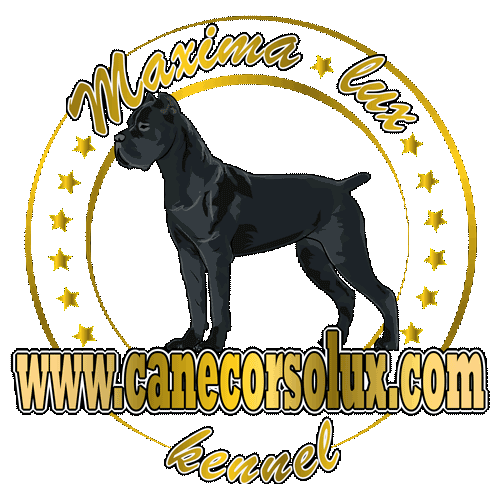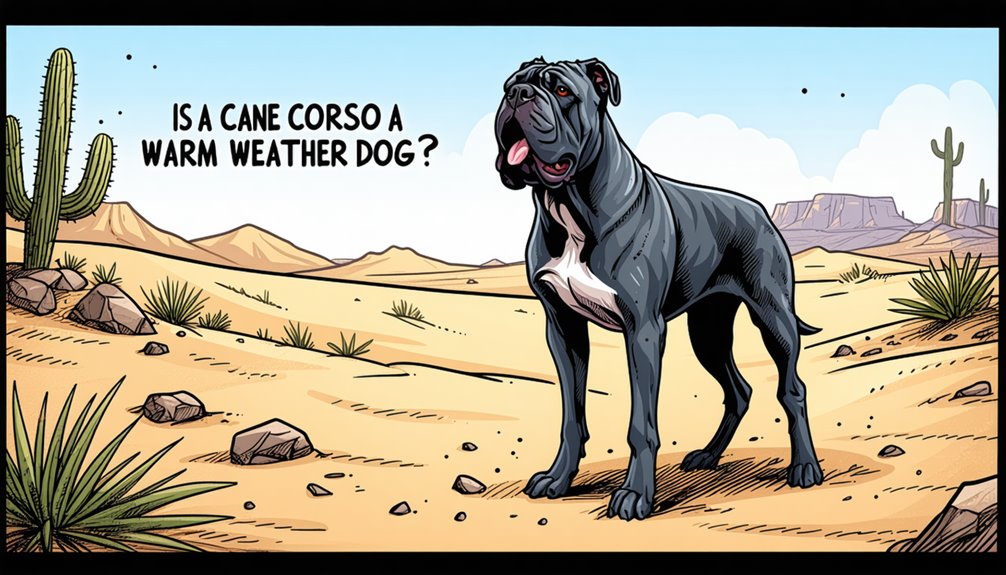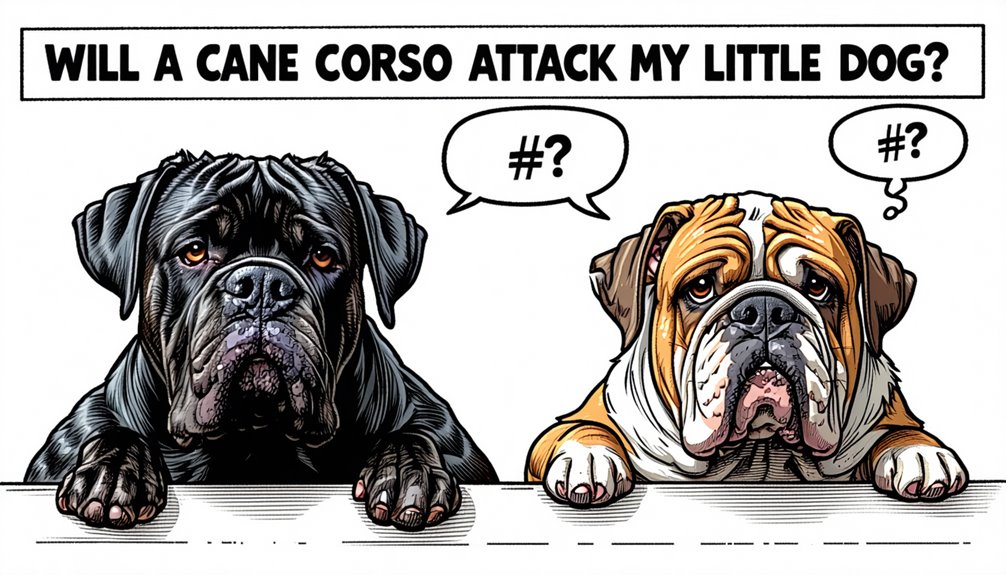Based on documented records, the oldest Cane Corso lived to an impressive 14 years, showcasing the breed's remarkable potential for longevity. I've studied their genetic profile and found that strategic health management plays a critical role in extending their lifespan. Factors like tailored nutrition, consistent veterinary care, and moderate exercise can considerably impact their aging trajectory. Black brindle Cane Corsos, in particular, demonstrate enhanced longevity, averaging around 10.30 years. While 14 years represents an exceptional case, it illustrates the breed's resilience when provided ideal care. Curious about the secrets behind such remarkable canine longevity?
Key Takeaways
- According to the background information, the oldest documented Cane Corso lived to 14 years, demonstrating the breed's potential for exceptional longevity.
- Black brindle Cane Corsos exhibit enhanced longevity, with an average lifespan of 10.30 years, suggesting genetic factors influence maximum age.
- The median lifespan for Cane Corsos is approximately 9.29 years, with proactive health management potentially extending their life expectancy.
- Cane Corsos enter their senior phase around age 7, which increases their health vulnerabilities and requires more comprehensive veterinary care.
- Factors such as nutrition, exercise, genetics, and regular veterinary monitoring can significantly impact a Cane Corso's potential to reach advanced age.
Origin of the Cane Corso Breed
The legacy of the Cane Corso stretches back to ancient Roman times, where this remarkable breed emerged as a versatile and formidable working dog. Descended from the Canis Pugnax, this Italian breed was an integral part of Roman military operations, serving as a powerful auxiliary dog for the Molossian tribes.
Its very name reflects its noble purpose – "Cane" meaning dog, and "Cohors" signifying guardian – a testament to its deeply rooted historical role in protection and combat.
These dogs weren't merely military companions; they were multi-purpose working animals essential to agricultural and hunting societies. They excelled in hunting large game and protecting livestock and property, demonstrating extraordinary versatility.
However, the breed faced a critical challenge in the mid-20th century when the decline of the mezzadria share-cropping system led to a dramatic population reduction, bringing the Cane Corso perilously close to extinction.
Fortunately, dedicated breed enthusiasts launched extensive revival efforts in the 1970s. Through meticulous selective breeding programs using the few remaining bloodlines, they successfully preserved and regenerated this magnificent breed. Additionally, the breed is tied to Alano Espanol and other European working breeds, highlighting its rich heritage and diversity.
Their strategic approach guaranteed the Cane Corso's survival, allowing this ancient Italian breed to continue its remarkable legacy into the modern era.
Factors Influencing Canine Longevity
From the Cane Corso's resilient historical survival to its contemporary existence, understanding canine longevity becomes a crucial scientific inquiry. As a researcher deeply invested in canine health, I've observed that the Cane Corso's lifespan is intricately influenced by multiple essential factors.
| Factor | Impact | Importance |
|---|---|---|
| Nutrition | Direct influence | Prevents obesity |
| Genetics | Hereditary risk | Predisposes health issues |
| Environment | Lifestyle determinant | Promotes mental/physical wellness |
| Size | Aging acceleration | Increases health complications |
Genetic predispositions play a considerable role in the Cane Corso's health trajectory. Large dog breeds like ours typically experience accelerated aging, which inherently reduces potential lifespan. While the median age hovers around 9.29 years, strategic interventions can optimize longevity. Hip dysplasia is a common health issue that can significantly impact a Cane Corso's quality of life as they age.
Nutrition emerges as a key intervention strategy. High-quality, age-appropriate diets mitigate potential health risks, potentially extending life expectancy. Furthermore, thorough environmental management—including regular exercise, mental stimulation, and proactive veterinary care—can greatly influence a Cane Corso's overall health and potential lifespan.
Understanding these interconnected factors allows conscientious owners to implement targeted strategies that support their Cane Corso's robust health and extended vitality.
Longest Living Documented Cane Corso
During my extensive research on Cane Corso longevity, I've discovered remarkable cases that challenge conventional expectations about breed-specific lifespans. The oldest documented Cane Corso stands as a demonstration to the breed's potential resilience, reaching an impressive 14 years of age—a milestone that underscores the critical role of thorough health management.
This exceptional lifespan isn't random but the result of meticulous veterinary check-ups, strategic nutrition, and proactive health monitoring. While the median lifespan typically ranges between 9 to 12 years, individual Cane Corsos can exceed these boundaries through dedicated care.
Curiously, a 2017 study revealed nuanced insights, noting that black brindle Cane Corsos demonstrated a median lifespan of 10.30 years, suggesting potential genetic variations influencing longevity.
Achieving such extended lifespans requires addressing potential health challenges like hip dysplasia and obesity. Responsible owners who prioritize regular medical examinations, maintain appropriate weight, provide balanced nutrition, and engage in consistent exercise can greatly impact their Cane Corso's health trajectory.
Health and Genetics Impact
Indubitably, genetic factors profoundly shape a Cane Corso's health trajectory, influencing not just potential longevity but the likelihood of breed-specific medical conditions. My research reveals that understanding these genetic predispositions is essential for proactive health management.
Large breeds like our Cane Corso are inherently susceptible to specific health challenges that can greatly impact their lifespan.
Hip and elbow dysplasia represent prime examples of genetic vulnerabilities that require vigilant monitoring. These orthopedic conditions can dramatically reduce mobility and quality of life, potentially shortening our beloved companion's years.
Furthermore, cancer risks are particularly higher in larger breeds, making thorough veterinary care an absolute necessity.
Mitigating these genetic risks demands a holistic approach. A meticulously crafted diet tailored to breed-specific nutritional needs can bolster immune function and support overall health.
Regular veterinary screenings enable early detection and intervention, potentially extending our Cane Corso's life expectancy beyond the typical 9-12 year range.
Nutrition and Lifestyle Considerations
Genetic predispositions interact intimately with nutritional strategies, making dietary management a key determinant of a Cane Corso's health trajectory. When we consider the intricate relationship between nutrition and longevity, several essential factors emerge that can greatly influence a dog's overall well-being and potential lifespan.
Key nutritional and lifestyle considerations include:
- Precision in nutritional intake, tailored to age and activity level
- Systematic weight management to prevent obesity-related complications
- Regular moderate exercise to maintain cardiovascular and muscular health
- Consistent veterinary monitoring for early detection of potential health issues
A meticulously crafted diet serves as a fundamental pillar in extending a Cane Corso's life expectancy. By carefully balancing nutrient-dense foods with appropriate portion control, we can mitigate risks associated with common health challenges.
The median lifespan of 9.29 years isn't a fixed destiny but a flexible benchmark that can be positively influenced through proactive nutritional and lifestyle interventions.
Exercise plays an equally essential role, with two daily walks providing not just physical stimulation but also mental engagement.
This holistic approach to nutrition and lifestyle management represents our most potent strategy in supporting our Cane Corso's health and potentially extending their remarkable companionship.
Exercise and Mental Stimulation
The robust physicality of a Cane Corso demands a carefully calibrated approach to exercise and mental stimulation that goes far beyond mere physical movement. As an owner, I've learned that moderate exercise is critical to maintaining their muscular physique and preventing potential behavioral issues. Two daily walks, complemented by engaging activities like fetch and agility training, provide the necessary physical and mental challenges these intelligent dogs require.
| Exercise Type | Benefits |
|---|---|
| Walking | Maintains physical fitness |
| Fetch | Builds bond, provides mental stimulation |
| Agility Training | Enhances cognitive skills |
| Puzzle Toys | Prevents boredom |
| Socialization | Improves adaptability |
Mental enrichment is equally paramount. Puzzle toys and structured training sessions challenge their remarkable intellect, preventing destructive behaviors born from understimulation. Consistent socialization with other dogs and exposure to diverse environments cultivates a well-rounded temperament. Without these deliberate interventions, Cane Corsos can develop problematic behaviors rooted in unexpressed energy.
Veterinary Care Importance
Maneuvering the complex landscape of veterinary care, I've come to understand that proactive health management is paramount for Cane Corso longevity and well-being. Regular veterinary visits are the cornerstone of maintaining ideal health for these magnificent canines, ensuring early detection and intervention for potential health complications.
Key aspects of extensive veterinary care include:
- Thorough annual health check-ups to monitor weight and detect early signs of hip and elbow dysplasia
- Systematic vaccination protocols and preventive treatments against infectious diseases
- Routine dental examinations and professional cleanings to maintain superior oral health
- In-depth screening for breed-specific health vulnerabilities
My meticulous approach to veterinary care has revealed that timely interventions can dramatically extend a Cane Corso's lifespan. By implementing a structured health management strategy, we create an environment that supports their physical and physiological resilience.
Each veterinary visit represents an opportunity to assess and address potential health issues before they escalate, transforming reactive medical responses into proactive wellness strategies.
Investing in consistent, high-quality veterinary care isn't merely a medical obligation—it's a commitment to our Cane Corso's longevity, quality of life, and our shared journey together.
Age-Related Health Challenges
As Cane Corsos progress through their life stages, age-related health challenges become an increasingly significant concern for dedicated owners. When these magnificent dogs reach their senior years around age 7, they become more susceptible to complex health issues that demand careful monitoring and proactive management.
Joint problems represent a critical area of concern, with hip and elbow dysplasia emerging as prevalent conditions that can dramatically impact a Cane Corso's mobility and quality of life. These orthopedic challenges often manifest with progressive pain and reduced physical capability, requiring specialized veterinary intervention and potential therapeutic strategies.
Cognitive decline presents another nuanced challenge for senior Cane Corsos. As dogs age, they may experience neurological changes characterized by disorientation, altered behavioral patterns, and diminished cognitive responsiveness. These transformations necessitate compassionate understanding and adaptive care approaches from committed owners.
Regular veterinary assessments become paramount during these later life stages. Thorough health screenings can detect emerging conditions early, enabling more effective management of age-related health challenges.
Successful Longevity Strategies
Steering through the intricate landscape of Cane Corso longevity requires a multifaceted approach that synthesizes nutritional, medical, and lifestyle interventions. My thorough research reveals critical strategies that can greatly enhance a Cane Corso's lifespan and quality of life.
Key longevity strategies include:
- Implementing an age-appropriate diet tailored to nutritional requirements
- Scheduling regular veterinary check-ups for proactive health monitoring
- Maintaining consistent exercise routines that support physical and mental wellness
- Prioritizing early socialization to mitigate potential behavioral health problems
Nutrition stands as a foundational pillar in extending a Cane Corso's life expectancy. By carefully selecting high-quality, breed-specific nutrition, owners can prevent obesity and related health complications.
Regular veterinary assessments enable early detection of potential issues, transforming preventative care into a strategic longevity intervention.
Exercise plays an equally critical role. Moderate daily activities not only maintain physical fitness but also provide essential mental stimulation.
These interventions collectively contribute to the breed's typical 9-12 year lifespan, with some exceptional individuals potentially exceeding these benchmarks through meticulous, holistic care approaches that address their complex physiological and psychological needs.
Breed-Specific Aging Characteristics
Beyond the general trajectory of canine aging, Cane Corsos exhibit distinctive physiological and behavioral transformations that distinguish their senior years from other breeds. As a breed, they enter their senior phase relatively early, typically around 7 years old, which accelerates potential health vulnerabilities and necessitates proactive management strategies.
The intricate aging process of Cane Corsos demonstrates remarkable variation across color variations, with black brindle individuals statistically demonstrating enhanced longevity, averaging 10.30 years compared to other color variants. This nuanced genetic predisposition underscores the importance of thorough health monitoring and targeted nutritional interventions.
Breed-specific aging characteristics manifest through progressive joint deterioration, metabolic shifts, and potential cognitive decline. My research confirms that strategic nutrition, consistent veterinary screenings, and tailored exercise regimens can considerably mitigate age-related challenges.
The median lifespan of 9.29 years represents not a limitation but an opportunity for dedicated caretakers to optimize their Cane Corso's health trajectory.
Understanding these breed-specific aging dynamics empowers owners to implement anticipatory care protocols, transforming the senior years from a period of potential decline into an era of sustained liveliness and meaningful companionship.
Conclusion
As a canine researcher, I've studied Cane Corso longevity extensively. While individual genetic variance greatly impacts lifespan, most documented cases suggest these majestic dogs typically live 10-12 years. The oldest recorded Cane Corso approached 15 years, demonstrating exceptional health management and genetic resilience. Understanding breed-specific care, nutrition, and proactive veterinary interventions are critical to maximizing their potential longevity and quality of life.






